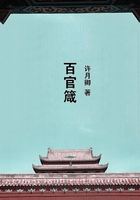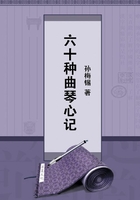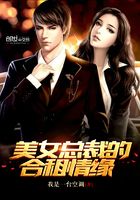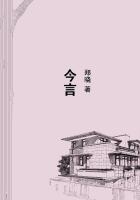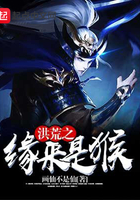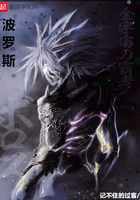"And a priest, too, I suppose," said Dalroy in an undecipherable manner.
"All these Champions are papists."
The American knelt down by the body, felt the heart, propped up the head and used some last efforts at restoration; but before the other journalist reappeared, followed by a doctor and a priest, he was already prepared to assert they were too late.
"Were you too late also?" asked the doctor, a solid prosperous-looking man, with conventional moustache and whiskers, but a lively eye, which darted over Kidd dubiously.
"In one sense," drawled the representative of the Sun.
"I was too late to save the man, but I guess I was in time to hear something of importance. I heard the dead man denounce his assassin."
"And who was the assassin?" asked the doctor, drawing his eyebrows together.
"Boulnois," said Calhoun Kidd, and whistled softly.
The doctor stared at him gloomily with a reddening brow--, but he did not contradict. Then the priest, a shorter figure in the background, said mildly: "I understood that Mr Boulnois was not coming to Pendragon Park this evening."
"There again," said the Yankee grimly, "I may be in a position to give the old country a fact or two. Yes, sir, John Boulnois was going to stay in all this evening; he fixed up a real good appointment there with me. But John Boulnois changed his mind; John Boulnois left his home abruptly and all alone, and came over to this darned Park an hour or so ago. His butler told me so. I think we hold what the all-wise police call a clue--have you sent for them?"
"Yes," said the doctor, "but we haven't alarmed anyone else yet."
"Does Mrs Boulnois know?" asked James Dalroy, and again Kidd was conscious of an irrational desire to hit him on his curling mouth.
"I have not told her," said the doctor gruffly--, "but here come the police."
The little priest had stepped out into the main avenue, and now returned with the fallen sword, which looked ludicrously large and theatrical when attached to his dumpy figure, at once clerical and commonplace. "Just before the police come," he said apologetically, "has anyone got a light?"
The Yankee journalist took an electric torch from his pocket, and the priest held it close to the middle part of the blade, which he examined with blinking care. Then, without glancing at the point or pommel, he handed the long weapon to the doctor.
"I fear I'm no use here," he said, with a brief sigh.
"I'll say good night to you, gentlemen." And he walked away up the dark avenue towards the house, his hands clasped behind him and his big head bent in cogitation.
The rest of the group made increased haste towards the lodge-gates, where an inspector and two constables could already be seen in consultation with the lodge-keeper. But the little priest only walked slower and slower in the dim cloister of pine, and at last stopped dead, on the steps of the house. It was his silent way of acknowledging an equally silent approach; for there came towards him a presence that might have satisfied even Calhoun Kidd's demands for a lovely and aristocratic ghost. It was a young woman in silvery satins of a Renascence design; she had golden hair in two long shining ropes, and a face so startingly pale between them that she might have been chryselephantine--made, that is, like some old Greek statues, out of ivory and gold. But her eyes were very bright, and her voice, though low, was confident.
"Father Brown?" she said.
"Mrs Boulnois?" he replied gravely. Then he looked at her and immediately said: "I see you know about Sir Claude."
"How do you know I know?" she asked steadily.
He did not answer the question, but asked another: "Have you seen your husband?"
"My husband is at home," she said. "He has nothing to do with this."
Again he did not answer; and the woman drew nearer to him, with a curiously intense expression on her face.
"Shall I tell you something more?" she said, with a rather fearful smile. "I don't think he did it, and you don't either."
Father Brown returned her gaze with a long, grave stare, and then nodded, yet more gravely.
"Father Brown," said the lady, "I am going to tell you all I know, but I want you to do me a favour first. Will you tell me why you haven't jumped to the conclusion of poor John's guilt, as all the rest have done? Don't mind what you say: I--I know about the gossip and the appearances that are against me."
Father Brown looked honestly embarrassed, and passed his hand across his forehead. "Two very little things," he said.
"At least, one's very trivial and the other very vague.
But such as they are, they don't fit in with Mr Boulnois being the murderer."
He turned his blank, round face up to the stars and continued absentmindedly: "To take the vague idea first.
I attach a good deal of importance to vague ideas. All those things that `aren't evidence' are what convince me. I think a moral impossibility the biggest of all impossibilities. I know your husband only slightly, but I think this crime of his, as generally conceived, something very like a moral impossibility. Please do not think I mean that Boulnois could not be so wicked. Anybody can be wicked--as wicked as he chooses. We can direct our moral wills; but we can't generally change our instinctive tastes and ways of doing things. Boulnois might commit a murder, but not this murder. He would not snatch Romeo's sword from its romantic scabbard; or slay his foe on the sundial as on a kind of altar; or leave his body among the roses, or fling the sword away among the pines. If Boulnois killed anyone he'd do it quietly and heavily, as he'd do any other doubtful thing-- take a tenth glass of port, or read a loose Greek poet.
No, the romantic setting is not like Boulnois. It's more like Champion."
"Ah!" she said, and looked at him with eyes like diamonds.
"And the trivial thing was this," said Brown. "There were finger-prints on that sword; finger-prints can be detected quite a time after they are made if they're on some polished surface like glass or steel. These were on a polished surface.




